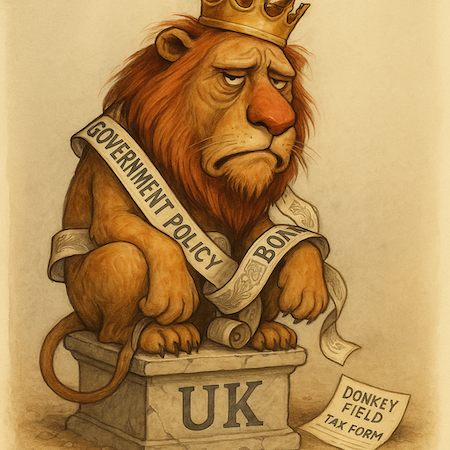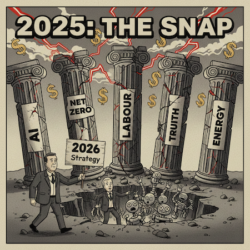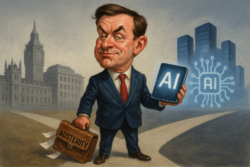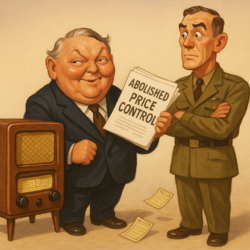- The UK is in the twilight zone
- Andy Burnham is right about the bond market
- Thatcher’s two and a half year Liz Truss Moment
It’s easy to dismiss the dystopian nightmare the UK is creeping into. You probably don’t want to know about it.
But look away for a week and you begin to notice just how rapid the descent really is. Like a cousin who has grown taller than you since you last saw her, it’s a real shock when you take stock.
I just got back from a week in Hokkaido – Japan’s northern island. A land of milk and honey, literally.
We were visiting family in the utter isolation of a Club Med resort. A dystopian nightmare environment of its own unique sort, for some. But catching up on the week’s news at the airport on Sunday made me wish I could ignore reality for a little longer after all…
To put it frankly, the UK looks like it is falling apart. In a surprising number of different ways at the same time.
Political analysts only notice when the government is mired in a series of scandals. Economists only notice when quarterly results are bad. Religious and patriotic social media warriors panic when someone gets arrested. And investors worry when bonds sell off.
But take a step back and you begin to notice the various crises are circling the drain ever faster.
Last week, we took a look at the unfolding economic debacle. Before that it was the bond yields. This week, political news is making the newly reshuffled government look like a game of musical chairs gone wrong.
But it’s the variety that’s breathtaking. We’re all used to a little chaos. Political careers are fragile. Financial markets oscillate.
But things feel like they’re reaching some sort of crescendo. Something no investor can ignore. So, let’s take a closer look…
Democracy is the only game everyone can lose
When I left for Hokkaido, we were still digesting Angela Rayner’s resignation over unpaid tax.
The only thing more Tory than unpaid property tax on a second third home is unpaid tax on a donkey field held in trust for your parents to reduce inheritance tax.
You couldn’t make it up.
But it’s not just Tory optics that Labour have adopted. It’s the policies too.
The government announced migrants will have to contribute to the UK or go home. And young people risk losing welfare if they refuse a job for too long.
For a second, I thought I’d missed an election and Nigel Farage had become PM already!
No wonder the Bank of England governor agreed to meet Nigel Farage and Richard Tice. And they say the Bank is politically independent…
I suspect Labour’s far-right lurch is one of those policy announcements that’s never meant to actually see the legislative books. Like most policies, really.
But it does beg the question when they’re anticipating an election… Why make political promises you won’t keep so many years from the next vote?
Just when I think I’ve seen it all, the NHS publishes comments on the benefits of cousin marriage…
Honestly, we’re the laughing stock of the world.
What’s gone so terribly wrong?
Like in Australia, we got cursed with a centre-right wing party that behaved so badly voters turned to the left for relief. Now they’re getting what they deserve. A completely bizarre mix of incoherent policies. And the same amount of cabinet chaos we were trying to avoid.
So, no noticeable change, really…
The government was supposed to stand tall purely because it wasn’t like the previous ones. Instead it has turned out to be even more like a caricature of its predecessors than they actually were themselves.
Imagine if the Conservatives had appointed a minister for homelessness who evicted a renter. Or selected a prime minister and deputy prime minister who both got caught out in tax scandals in quick succession.
It would surprise nobody.
A Reform UK government, on the other hand, promises to be full of surprises.
But politics gets far too much credit for Britain’s decline. There are plenty of other people to blame.
The Bank of England is running the country
Most investment analysts are telling you that we are in an age of “fiscal dominance”.
This occurs when government debt is so high that the central bank is stuck having to support the government’s borrowing. It cannot withdraw that support for fear of causing a panic in the bond market.
This leaves the central bank merely reacting to fiscal policy. Inflation is no longer the priority of monetary policy. Just keeping the government in funds is.
Historically, this situation ended in inflationary spikes. Because politicians cannot be trusted with a deficit they know the central bank will ultimately have to finance. And so they spend too much. That’s what happened during COVID.
But the doctrine of fiscal dominance has things precisely backwards. Central banks can decline to finance the government for long enough to force political change. As they did to Greece and Italy ten years ago, and Liz Truss three years ago. Central banks actually wield all the power over the government.
That’s why the Conservatives pursued so much immigration after COVID. And why Labour are so obsessed with black holes…of a fiscal sort, I mean.
It was demanded by the boffins at the Treasury, Office for Budget Responsibility and Bank of England. Together, they represent economic orthodoxy. And any government that pursues a policy which disagrees with economic orthodoxy risks being left high and dry by the Bank of England.
Which means…
Andy Burnham is right about the bond market
The only left-wing politician with their reputation still intact promptly lost it while I had my head in the clouds in Japan.
In an interview, Andy Burnham said the country needs to get “beyond this thing of being in hock to the bond markets.”
Sadly, imitating Liz Truss didn’t go down so well with anyone.
Unfortunately for all of us, Andy is right.
A government that is obsessed with bond yields is going to be under the thumb of the Bank of England. Any attempt to reform the UK will go down in a blaze of bond market ignominy.
If the Greeks couldn’t do it with a referendum in 2015, I don’t see who can dodge the bond bullet now.
Well, there is one person who could do it. Did it, even.
The only way out of this mess is to risk the ire of the bond market for long enough to achieve serious reforms. Reforms that subsequently regain confidence by proving economic orthodoxy wrong.
The UK 10-year gilt bond yield reached an all-time high of 16.09% in November of 1981. That’s two and a half years into Margaret Thatcher’s government. A very prolonged “Liz Truss Moment” indeed.
How long will we give Nigel?
Until next time,

Nick Hubble
Editor at Large
P.S. Andy Burnham is right — the UK really is “in hock to the bond markets.” With fiscal dominance, rising gilt yields and political chaos, Britain’s economy is boxed in. In that kind of environment, traditional portfolios get squeezed. That’s exactly why we’ve been highlighting what we call the new Wealth Window. It’s not just a way to sit tight and preserve capital like gold does — it’s a way you could actively grow your wealth while the UK staggers through this bond-market trap. See how to position yourself here.




